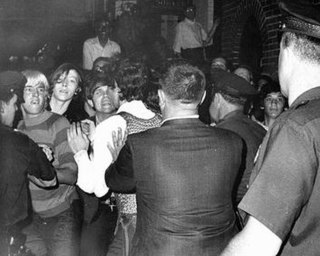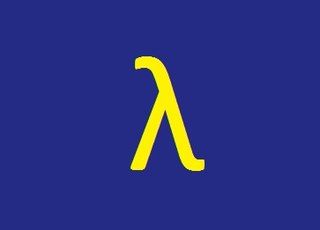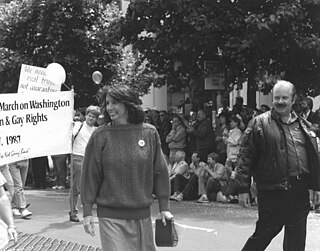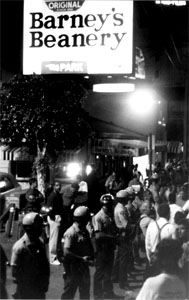Related Research Articles

The Stonewall riots, also known as the Stonewall uprising, Stonewall rebellion, Stonewall revolution, or simply Stonewall, were a series of spontaneous, violent demonstrations against a police raid that took place in the early morning hours of June 28, 1969, at the Stonewall Inn, in the Greenwich Village neighborhood of New York City. Although the demonstrations were not the first time American homosexuals fought back against government-sponsored persecution of sexual minorities, the Stonewall riots marked a new beginning for the gay rights movement in the United States and around the world.

AIDS Coalition to Unleash Power is an international, grassroots political group working to end the AIDS pandemic. The group works to improve the lives of people with AIDS through direct action, medical research, treatment and advocacy, and working to change legislation and public policies.

The Gay Activists Alliance (GAA) was founded in New York City on December 21, 1969, almost six months after the Stonewall riots, by dissident members of the Gay Liberation Front (GLF). In contrast to the Liberation Front, the Activists Alliance solely and specifically served to gay and lesbian rights, declared themself politically neutral and wanted to work within the political system.

Gay Liberation Front (GLF) was the name of several gay liberation groups, the first of which was formed in New York City in 1969, immediately after the Stonewall riots. Similar organizations also formed in the UK, Australia and Canada. The GLF provided a voice for the newly-out and newly radicalized gay community, and a meeting place for a number of activists who would go on to form other groups, such as the Gay Activists Alliance, Gay Youth New York, and Street Transvestite Action Revolutionaries (STAR) in the US. In the UK and Canada, activists also developed a platform for gay liberation and demonstrated for gay rights. Activists from both the US and UK groups would later go on to found or be active in groups including ACT UP, the Lesbian Avengers, Queer Nation, Sisters of Perpetual Indulgence, and Stonewall.

The gay liberation movement was a social and political movement of the late 1960s through the mid-1980s in the Western world, that urged lesbians and gay men to engage in radical direct action, and to counter societal shame with gay pride. In the feminist spirit of the personal being political, the most basic form of activism was an emphasis on coming out to family, friends, and colleagues, and living life as an openly lesbian or gay person.
Lavender Menace was an informal group of lesbian radical feminists formed to protest the exclusion of lesbians and their issues from the feminist movement at the Second Congress to Unite Women in New York City on May 1, 1970. Members included Karla Jay, Martha Shelley, Rita Mae Brown, Lois Hart, Barbara Love, Ellen Shumsky, Artemis March, Cynthia Funk, Linda Rhodes, Arlene Kushner, Ellen Broidy, and Michela Griffo, and were mostly members of the Gay Liberation Front (GLF) and the National Organization for Women (NOW). They later became the Radicalesbians.

Jean O'Leary was an American lesbian and gay rights activist. She was the founder of Lesbian Feminist Liberation, one of the first lesbian activist groups in the women's movement, and an early member and co-director of the National Gay and Lesbian Task Force. She co-founded National Coming Out Day.

"The Woman-Identified Woman" was a ten-paragraph manifesto, written by the Radicalesbians in 1970. It was first distributed during the Lavender Menace protest at the Second Congress to Unite Women, hosted by the National Organization for Women (NOW) on May 1, 1970, in New York City in response to the lack of lesbian representation at the congress. It is now considered a turning point in the history of radical feminism and one of the founding documents of lesbian feminism redefining the term "lesbian" as a political identity as well as a sexual one.

The Second National March on Washington for Lesbian and Gay Rights was a large political rally that took place in Washington, D.C., on October 11, 1987. Around 750,000 people participated. Its success, size, scope, and historical importance have led to it being called, "The Great March". It marked the first national coverage of ACT UP, with AIDS activists prominent in the main march, as well as making headlines the next day during mass civil disobedience actions at the United States Supreme Court Building.
Henry "Hank" Wilson was a longtime San Francisco LGBT rights activist and long term AIDS activist and survivor. The Bay Area Reporter noted that "over more than 30 years, he played a pivotal role in San Francisco's LGBT history." He grew up in Sacramento, and graduated with a B.A. in education from the University of Wisconsin–Madison in 1971.

Stop the Church was a demonstration organized by members of AIDS Coalition to Unleash Power on December 10, 1989, that disrupted a Mass being said by Cardinal John O'Connor at St. Patrick's Cathedral in New York City. One-hundred and eleven protesters were arrested, 53 of whom were arrested inside the church. The main objective of the demonstration was to protest O'Connor's opposition to the teaching of safe sex in the public school system, and his opposition to the distribution of condoms to curb the spread of AIDS. During planning, the protest was joined by Women's Health Action and Mobilization (WHAM!), who opposed the Catholic position on abortion rights.

A zap is a form of political direct action that came into use in the 1970s in the United States. Popularized by the early gay liberation group Gay Activists Alliance, a zap was a raucous public demonstration designed to embarrass a public figure or celebrity while calling the attention of both gays and straights to issues of gay rights.

Martha Shelley is an American activist, writer, and poet best known for her involvement in lesbian feminist activism.

Ivy Bottini was an American activist for women's and LGBT rights, and a visual artist.

Michael Anthony Petrelis is an American AIDS activist, LGBTQ rights activist, and blogger. He was diagnosed with Acquired Immunodeficiency Syndrome (AIDS) in 1985 in New York City, New York. As a member of the Lavender Hill Mob, a forerunner to the AIDS Coalition to Unleash Power, he was among the first AIDS activists to protest responses to the disease. He was a co-founding member of ACT UP in New York City, New York, and later helped organize ACT UP chapters in Portland, Oregon, Washington, D.C., and New Hampshire, as well as the ACT UP Presidential Project. Petrelis was also a founding member of Queer Nation/National Capital, the Washington D.C. chapter of the militant LGBTQ rights organization.
Lesbian Feminist Liberation was a lesbian rights advocacy organization in New York City formed in 1972.
Martin "Marty" Robinson was an American gay activist, "known for his provocative protests."
Dissent from the Catholic Church's teaching on homosexuality has come with a number of practical and ministerial arguments from both the clergy and the laity of the Catholic Church. The Catholic Church teaches that while being gay is not a sin in and of itself, any sex outside of marriage, including between same-sex partners, is sinful, and therefore being gay makes one inclined towards this particular sin.
Ortez Alderson was an American AIDS, gay rights, and anti-war activist and actor. A member of LGBT community, he was a leader of the Black Caucus of the Chicago Gay Liberation Front, which later became the Third World Gay Revolution, and served a federal prison sentence for destroying files related to the draft for the Vietnam War. In 1987, he was one of the founding members of ACT UP in New York City, and helped to establish its Majority Action Committee representing people of color with HIV and AIDS. Regarded as a "radical elder" within ACT UP, he was involved in organizing numerous demonstrations in the fight for access to healthcare and treatments for people with AIDS, and participated in the group's meetings with NYC Health Commissioner Stephen Joseph as well as the FDA. In 1989, he moved back to Chicago and helped to organize the People of Color and AIDS Conference the following year. He died of complications from AIDS in 1990, and was inducted posthumously into the Chicago LGBT Hall of Fame.
References
- 1 2 3 4 Boffey, Phillip M. (February 26, 1987). "Homosexuals Applaud Rejection Of Mandatory Tests For AIDS". The New York Times.
- 1 2 Lambert, Bruce (March 24, 1992). "Martin Robinson, 49, Organizer Of Demonstrations for Gay Rights". New York Times. Retrieved April 18, 2019.
- ↑ Kahn 2005, p. 5.
- ↑ "The Advocate & the Academy". AIDS Clinical Trials Group. Retrieved April 18, 2019.
- 1 2 3 Clendinen, Dudley; Nagourney, Adam (2016). Out for Good: The Struggle to Build a Gay Rights Movement in America. New York: Simon & Schuster. p. 543. ISBN 978-0-684-86743-4.
- 1 2 3 4 5 Matthew Riemer & Leighton Brown, We are everywhere: Protest, Power and Pride in the History of Queer Liberation, Ten Speed Press (2019); p.253
- 1 2 3 4 5 Kahn 2005, p. 6.
- 1 2 Kahn 2005, pp. 5–6.
- ↑ Finder, Alan (July 5, 1986). "Police halt rights marchers at Wall St". The New York Times. Archived from the original on April 18, 2019. Retrieved May 15, 2019.
- 1 2 3 4 5 Faderman 2015, p. 425.
- ↑ Kahn 2005, pp. 6–7.
- ↑ Kauffman, L.A. (2017). Direct Action: Protest and the Reinvention of American Radicalism. London / New York: Verso. p. 294, n. 38. ISBN 978-1-78478-409-6.
- ↑ The Advocate. Liberation Publications. 1992. p. 136. Retrieved May 15, 2019.
... Martin Robinson, a longtime gay activist, died of complications from AIDS March 19 ...